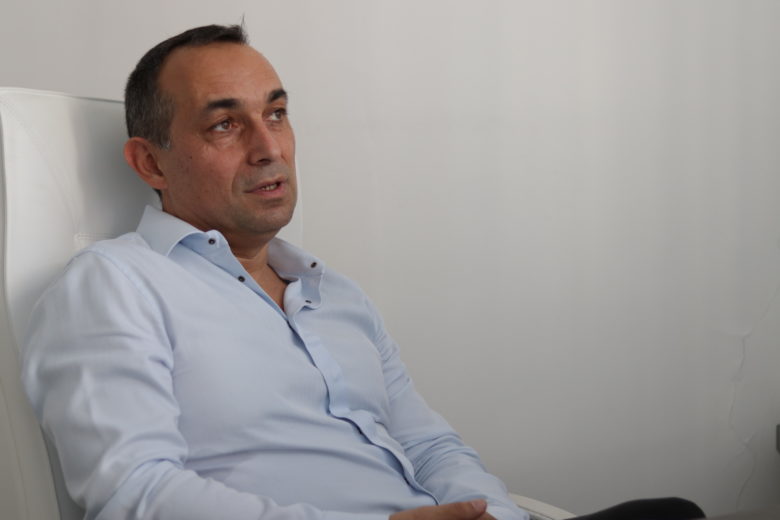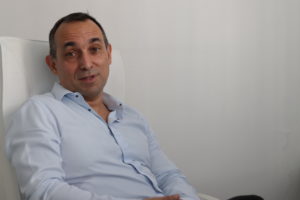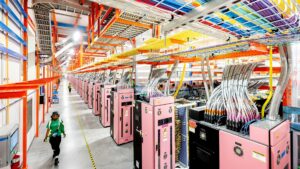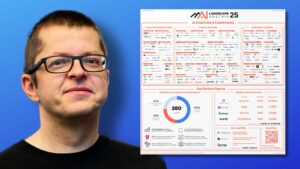Nikolay Martinov: The Building I See From My Office Window Costs More Than All The Venture Capital Invested In Bulgaria Last Year

Nikolay Martinov is a serial investor and trader. In 2005, he pioneered and executed the first IPO in Bulgaria for the online media company Investor.bg. For three consecutive years, he was honored as the broker with the highest transactional volume.
Martinov is currently managing partner at Impetus Capital, a private equity firm, where he participates in the entire cycle from investments to exits, and together with his partner Viktor Manev recently registered the first Bulgarian alternative investment find. Coming from the stock exchange world, he has a slightly different mindset than many of the VC investors we usually talk to. As he says, he could have retired in his 30s. Yet he’s still in the investment business willing to contribute to the development of the local economy.
Impetus Capital now has €2.5M under management and its portfolio consists of companies like the logistics innovator Discordia, the IoT company Allterco (already public),, life science data aggregator BioSeek, biometric company Biodit, Excitel, the fastest-growing internet provider in India.
Martinov is not on the lookout for modern investments, but for profitable ones. Here’s how a stock exchange broker turned into a VC is ticking:
Trending Topics: What was the idea to start with venture investments and what led you to Impetus Capital?
Nikolay Martinov: I have always been a very early investor. When I was a student I invested in the stock of First Private Bank when it was in the process of establishment – they gave me a receipt for my future shares on which it was written that I had become a shareholder. Years after that, at the hype of the trading of the bank’s shares I successfully sold them long before bank’s bankruptcy. That’s how I started my 30 years of experience dealing on the capital markets. In the last ten years, the Bulgarian Stock Exchange has become a regulated private equity market: it has slowed down a lot, the average life of an investment is seven to eight years, which is comparable to the cycle in private equity. In this regard, venture and equity investments are a logical continuation.
Capital markets taught me about the sense of timing, closing deals, and exits. Throughout my professional career as a broker, there have been thousands of deals in my account – I know when to buy and when to sell.
Aren’t there any differences in the approach to companies? In venture and equity investing, there is personal contact with entrepreneurs, there are not only statistics, but decisions are also made differently.
The main difference is that on the stock exchange companies already have an operating business, while for startups their business is in the future. Another difference is that there is much more information about public companies than private ones and public companies are much more organized and structured.
But in the capital market, you have to wait for a good investment situation in order to enter a deal. While with private equity, you can be proactive, find and structure investment and afterward to support and protect the company you have invested in. In 5 out of 8 from our current investments, we sit at the board level and are given strong protective (veto) rights while at the rest of the companies we have shareholder agreements with similar protection. This is an effective mechanism for long-term investor’s protection on a daily basis.

I have often heard you talk about the lack of capital for innovation in Bulgaria.
Yes, there are only eight teams that are heavily underfunded here. A considerable part of them work with European and state money and follow heavy regulatory rules, which considerably limits the possibilities for doing business. Accordingly, the time to close a deal can be very long, and for a young technology company, it is sometimes a matter of life and death.
Completing documents and references slows down the process a lot. Against the backdrop of all the restrictions that the funds currently have, I think that the managers are doing very well. The companies’ mortality and losses are significantly lower than the average mortality rate of the western markets.
At the same time, Bulgarians are very fond of investing in bricks and concrete and this sector continues to operate with huge capital inflow. Just an example – the building they built for a year in front of my window, is worth more than all the venture capital invested in the ecosystem over the last two years.
You recently started a new for Bulgaria category investment fund – alternative investment fund. What are the differences between the traditional funds in Bulgaria and yours? What’s the idea behind your new endeavor?
Impetus started with investing the money I had from the capital markets into the companies me and my partner Viktor selected. We combined our previous experience and knowledge of the development of the international markets while we have a deep understanding both of the private and regulated (capital) markets. Our first attempt to increase the number of our investments is called ImVenture 1, a completely private investment structure. The second – ImVenture 2, is a little different. It is an alternative investment fund under the AIFMD with shares registered in the central depository. This means that we can raise funds from other players in the market – pension funds, for example, which traditionally do not invest in Bulgaria. The capital at the establishment of the second fund is BGN 2.5 million and is planned to increase to BGN 40-50 million.
Perhaps the main difference between what we have done so far, which is close to traditional venture investing, and what we are planning is to answer the huge need of the market for more growth capital. The ratio of startups at a very early stage in the portfolio of ImVenture 1 was 25% while in InVenture 2 they will be only 10%. Now we are focused on providing capital at later stages.

Why are you planning to invest less in startups with the new fund? And what is your investment thesis?
Our biggest strength is with growth companies, as they need different types of financing and access to capital – that’s the point at which we can add value most. And there are enough funds, thanks to the state initiatives, to support startups. The missing link is the investments for growth – there are no funds at the moment to invest at this stage, and rarely Bulgarian companies manage to attract financing from foreign funds, which leads to the end of many good ideas. Our idea is to support and accelerate the growth of the companies that have already shown vitality. The other funds on the market with LPs as the government and the EIF are required to invest in a large number of companies. Our approach is to be focused on our portfolio not exceeding 13-17 companies. While during the first fund we had a maximum ticket of 400k BGN, now we have up to about 1 – 1.5m BGN to invest in tranches.
We participate in setting portfolio companies’ goals and we look for reaching revenues growth and sustainable EBITDA levels.
To summarize, ImVenture 2’s philosophy is to invest in growing and innovative Bulgarian companies exposed to international markets. We are looking for growth, export focus, and innovation. We have identified 440 companies that have grown 25% in revenue over two years, and there are other 10k companies whose revenue is up 25%. We have to choose only several from these companies. If I have to make a comparison with this situation – the Bulgarian private equity for the middle market is like a stadium with seven or eight investment teams scouting, and on each square meter, there are 3-4 interesting companies buried in the ground.

What does innovation mean to you?
A new look at an old problem. Due to our considerable experience in the capital and private market and previous consulting in various industries, we can understand the businesses in many sectors. We have no preference for verticals. Innovations happen in media, food, retail, logistics – not everything in our life is a digital technology.
We have three investments that are not technology-related companies, but they have innovation and are able to grow consistently. Discordia, for example, which is a logistics company , has grown by 40% over the last three years, both sales and EBITDA. It is important to go deep and see what drives a company to grow and strengthen it.
There is a huge difference between modern and profitable investments. Modern is to invest in unicorns and higher valuations. WeWork is a great example of this unicorn profitability (smiles). Profitable is something that is still undiscovered and its price is low. Many Bulgarian companies look like a rough diamond – a piece of glass that needs grinding.
With such a thesis, what is the return you have set as a goal?
At least five times, given the capital and expertise we invest in the companies. Good venture investors reach 20-25% a year. This is my goal. The profitability I have already achieved with other funds in the past is 30%.
Here investors are used to giving their money to someone who’d keep them safe and they could expect a return of lower than 1% annually. 10 years’ return from investing in government bonds today is lower than one year’s inflation. While investing in a growth economy, the annual return is 20-25%. These returns are better than the yields of government bonds and private equity historically had better returns than capital markets and bonds.
The important step is that pension funds have the potential to invest in alternative investors such as Impetus. And just one example – one of the companies serviced by Bioseek (a company in our portfolio – ed.n.) supports some 600 alternative funds, endowments, and family offices. Amongst them we looked at the yields of the New York State Teachers’ Retirement System – they have reached an annual money-weighted rate of return, net of investment expenses of 8.95% in 2018.
Having in mind your connection to the capital market and your investments over the years, I come to the conclusion that the stock market is part of the plan for your portfolio companies.
Exits at the capital market are not an end in itself but are of great potential. There is a lot of capital on the stock market that cannot flow to private companies. Pension and mutual funds, for example, are now eligible to invest 1% of their assets in alternative funds. The savings of the Bulgarians, who stand on negative interest rates in the banks can also be channeled via the capital market into a financial instrument.

Yet we have an example from very recently that the stock exchange in Bulgaria may not be a place for high-risk companies. The prospectus of Biodit was rejected by the Financial Supervision Commission.
Put this was it sounds like a sentence. In my opinion, what happened is a mere victory of the status quo over the new economy. The status quo benefits from past things – savings into deposit accounts, bricks and concrete, and machines. Biodit says “we will have sales in a little while” building a subscription economy and states its valuation on its intellectual property. In the new economy, there are no factories, there is software, there is intellectual property, and their depreciation is different from that of the machines. Such an attitude towards the technology business may be lethal.
Outside of funds, what are you investing in?
The only thing I invest privately is in my personal development – seminars in marketing and sales and leadership trainings. These are the issues that concern me. I don’t invest in bricks.
Read also:





























